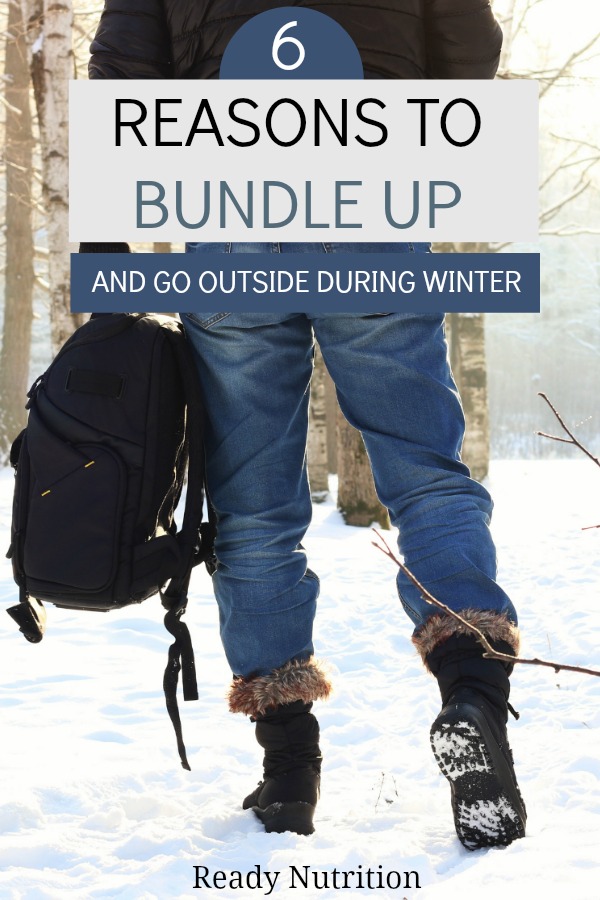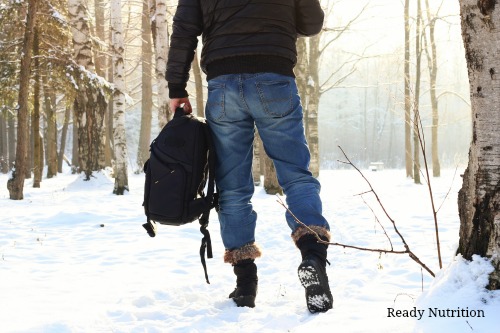Brrrr! Winter is here, and if it is chilly in your neck of the woods, you might be tempted to hunker down and stay indoors until Spring arrives.
Winter can really take a toll on our moods, making even the warmest personalities turn as chilly as the air outside. It’s getting dark at 5 pm now, and you might find yourself making excuses to stay inside, bundled up in cozy blankets in front of the fire.
However, staying indoors during the colder months won’t do anything to improve your mood or your health – in fact, research suggests the opposite is true.
You don’t have to spend hours outside to reap the benefits. Just a few minutes a day has been proven to improve mood and physical health.
So, bundle up and get out there!
Here are six reasons to get outside during winter.
Sunlight helps your body produce Vitamin D.
On sunny days, go outside and soak up some of the “Sunshine Vitamin” – Vitamin D. It is unique in that it is a vitamin AND a hormone your body can make with help from the sun. Research suggests that low levels of vitamin D are associated with mood disorders and depression.
Vitamin D deficiency is not uncommon. Because we spend more time indoors during winter, it can be hard to get enough – which is why getting some sunlight is so important during the colder months.
Some vitamin D researchers have found that somewhere between 5–30 minutes of sun exposure between 10 AM and 3 PM at least twice a week to the face, arms, legs, or back without sunscreen usually leads to sufficient vitamin D synthesis. Indoor light therapy can help, too.
Time outdoors boosts your immune system.
Being outside improves our immune systems. This is especially important for children, as it helps them build up their natural resistance to various germs. When children come into contact with dirt, bacteria, and animals during outside play, they are helping to reduce the risk of developing allergies and autoimmune diseases in the future.
As for being concerned that the cold makes us more susceptible to illness, as we explained in Immune System-Boosting Nutrients You May Need During Fall and Winter, the truth is more complicated:
Being cold doesn’t directly cause us to get sick, but cold air may contribute to conditions that lead to illness, according to a report by Healthline. Factors related to colder weather may actually be the culprits. Some viruses prefer the chillier weather, including rhinoviruses (they cause the common cold and replicate better at cooler temperatures) and influenza viruses (they peak in winter). The dry air outside and in homes with central heating may make it easier for viruses to infect dry nasal passages. Low indoor humidity and poor ventilation may also play a role. And, because we tend to spend more time inside with other people during the colder months, we are more likely to share germs.
Fresh air is good for you.
Getting outside helps your body get a break from indoor pollution. It is important to get fresh air because all of the bacteria and germs that you bring into the house get recycled over and over again through your home’s heating and venting system. The more time you spend inside, the more you are exposed.
Studies have shown that walking outside can improve brain function, mental focus, and creativity.
Be sure to dress appropriately for the weather. Try layering your clothing and be sure to wear proper footwear, especially if you will be walking on snow or ice.
It will help you reduce stress.
Research has shown that the Japanese practice of Shinrin-yoku (“taking in the forest atmosphere” or “forest bathing”) is an excellent stress-reducer. Because stress plays a role in so many ailments (it can adversely affect the immune, cardiovascular, neuroendocrine, and central nervous systems) including heart disease, weight gain, insomnia, pain, gastrointestinal disorders, and even cancer, getting outside can provide wide-ranging health benefits.
Being outside can boost your mood.
Natural light boosts serotonin, one of your body’s feel-good chemicals. “Physiologically, we know serotonin levels in the brain are lowest in winter. Going outside can increase positive mood and alleviate depression,” Kathryn A. Roecklein, Ph.D., associate professor, Department of Psychology at the University of Pittsburgh, told NBC News:
Roecklien conducted a study revealing how light therapy can help those with seasonal mood disorders. “We know that inside light levels are lower than outside light levels. And we know winter light levels are lower than summer light levels. So being inside for a majority of the winter may be a double strike in terms of getting the light we need for energy levels, alertness, mood and cognitive functioning,” she explains.
You’ll burn more calories.
If you exercise outside in the cold, your body actually burns more calories to regulate your core temperature. Some winter-specific outdoor activities, like skiing and ice skating, burn a lot of calories and are fun for the whole family.
Studies also have shown that exercising in cold weather can transform white fat (specifically belly and thigh fat) into “brown fat”. Brown fat is often referred to as “good” fat because it helps to burn rather than store calories – its purpose is to use calories to generate heat.
A 2014 study published in the Journal of Clinical Endocrinology and Metabolism showed people have more genetic markers for brown fat in the winter than during the warmer months.
And, research conducted at the University of Maastricht in the Netherlands found that exercising in the cold burns fat quicker than exercising in comfortable temperatures. This is because deposits of brown fat are activated as the body learns to warm up faster.
Dr. Adam Tenforde, an assistant professor of sports medicine and rehabilitation at Harvard-affiliated Spaulding Rehabilitation Network, told Harvard Health that in some ways, winter can offer benefits you don’t get during warmer months. Cold weather may improve endurance, he explains:
“In colder temperatures your heart doesn’t have to work as hard, you sweat less, and expend less energy, all of which means you can exercise more efficiently.”
So there you have it! Are you finding ways to spend time outside this winter? If so, please tell us about it in the comments.
Be well!

This article was originally published at Ready Nutrition™ on January 30th, 2019








I am a family nurse practitioner and I tell my patients this all winter (and summer too)